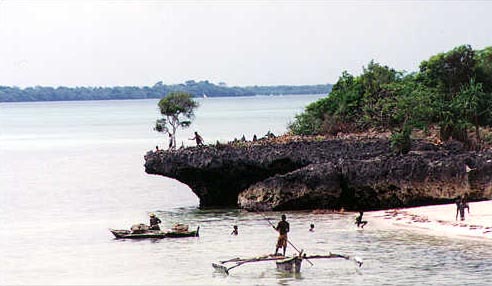
Official Peace Corps Information on Programs in Benin
Benin, formerly known as Dahomey, has emerged as a beacon of democracy and one of the most stable countries in Africa. In the first decade after independence in 1960 the country was ruled by a succession of military leaders until Major Mathieu Kerekou seized power in 1972 and gradually restored civilian rule.
While Benin has seen economic growth over the past few years, it remains among the world's poorest countries. Human and material resources are often insufficient for the country to provide quality teaching for schoolchildren, to care for the health of families, to preserve and restore the natural environment, and to promote business skills. Peace Corps Volunteers are addressing these needs with a broad range of activities in business development, education, environment, and health. In a recent letter to the Peace Corps, President Kerekou of Benin declared, "Your Volunteers offer to the citizens of my country a model and another view of what they themselves can contribute to the development of the Republic of Benin. The reports I receive from the people, as well as from the Ministers of my government, bear witness to the need and the durability of Peace Corps activities in Benin's development."
Business Development
Informal business activities dominate the Beninese economy and provide jobs for the majority of people outside of the public sector. However, local non-governmental organizations (NGOs) and micro-entrepreneurs lack basic management skills. At the government's request, Volunteers work directly with market women, entrepreneurs, village associations, and NGOs to teach marketing, accounting, business management, and organizational techniques. As a result, more goods are being produced for a profit and local organizations are able to address some of their communities' needs.
In FY 2000, Peace Corps Volunteers and their counterparts transferred basic business skills to 260 women. In addition, 250 entrepreneurs have been trained in financial and organizational management.
Education
Volunteers have helped Benin improve the quality of education by teaching English, math, physics, and chemistry in secondary schools and by developing improved teaching materials, such as instructor lesson plans and student workbooks. Although the Peace Corps has phased out its Math and Science project, it will continue to collaborate with the Ministry of Education to provide qualified English teachers and develop English textbook materials.
Volunteers are incorporating the international science program, Global Learning and Observation to Benefit the Environment (GLOBE), into the school curriculum. GLOBE connects students around the world via the Internet to share their knowledge of the environment. Volunteers continue to introduce thousands of students and hundreds of teachers to the GLOBE program every year.
Volunteers have taught more than 11,000 secondary students to improve their study habits and examination skills. Nearly 9,000 of these students improved their performance on English, math and physics/chemistry national exams during the 1999/2000 academic school year.
Environment
Benin is faced with serious environmental consequences due to annual deforestation of 2,500,000 acres of land, rapid reduction of soil fertility, and 70 percent of its population working in rural agriculture. In response, Peace Corps has strengthened its Environmental Action project and expanded its scope to include environmental education. Education is an integral part of the project, which has included development of an Environmental Education Guide, and the promotion of environmental clubs and the GLOBE program. Most recently, the Ministry of Environment has requested Peace Corps Benin's assistance in promoting environmental health where appropriate.
Volunteers are working on activities related to community forestry, soil conservation, environmental protection, and environmental education. Volunteers help to increase villagers' awareness of environmental degradation and to provide training in practical methods to address these problems. During a National Tree Day celebration in Parakou, in the northern region of Benin, more than 20 environmental club members presented skits, songs, poems, and essays, and demonstrated the benefits of fuel conserving stoves to more than 300 villagers/host country nationals.
Health
Rural communities in Benin face a myriad of health issues, including: high infant and maternal mortality rates, poor to non-existent health care, an accelerated HIV/AIDS rate, low immunization coverage, and little in the way of social services for disadvantaged people. Volunteers collaborate with social service centers throughout the country, which are sponsored by the Ministry of Social and Family Protection. The focus of the project is health education with an emphasis on maternal and child health issues.
HIV/AIDS is one of Benin's growing social health problems. Volunteers in all projects continue to integrate HIV/AIDS information into their activities. In 2000, more than 700 community members participated in HIV/AIDS activities such as games and skits, as well as educational discussions developed to increase public awareness and to teach youth about the threat of HIV/AIDS.